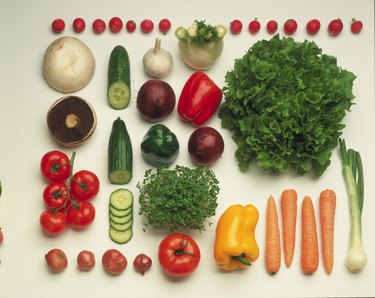
Vegetables have calories, so you could theoretically gain weight if you eat large amounts of them. However, eating veggies will typically help you shed pounds rather than make you gain, as long as you stick with lower-calorie vegetables and don't prepare them with high-calorie ingredients. In general, you should focus on eating more veggies each day -- not fewer.
Calories in Vegetables
Video of the Day
Adding more vegetables to your diet doesn't have to mean eating a lot more calories, if you stick with non-starchy vegetables. A 3-ounce serving of radishes, or about seven radishes, only has about 10 calories. For 15 calories, you can eat 1 1/2 cups of shredded lettuce, 1/3 of a medium cucumber or two stalks of celery, and, for 20 calories, you can eat five spears of asparagus, 3/4 cup of green beans, five medium mushrooms or 1/2 medium summer squash.
Video of the Day
However, starchy vegetables, such as potatoes, sweet potatoes or corn, are much higher in calories, with each serving containing between 90 and 110 calories. Because of this difference in calories, non-starchy vegetables are usually recommended for weight loss.
Vegetables and Weight Loss
Non-starchy vegetables contain a lot of water and fiber and relatively few calories per serving; in other words, they're low in energy density. Foods that are low in energy density may help with weight loss because you can eat a large enough portion of them to fill you up without consuming a lot of calories.
A study published in The American Journal of Clinical Nutrition in 2009 found that eating more vegetables was associated with a small amount of weight loss over time. The opposite is also true, with people eating fewer vegetables more likely to gain weight. A study published in Obesity in 2007 found that people who ate fewer fruits and vegetables per day gained more weight over a 10-year period than those who ate more. This may be because people who eat fewer vegetables are likely to eat more foods that are linked to weight gain.
Recommended Vegetable Intake
Most people don't eat the recommended amount of vegetables. Women should eat at least 2 to 2 1/2 cups of vegetables each day, and men should eat 2 1/2 to 3 cups. Each cup of raw leafy green vegetables only counts as 1/2 cup of vegetables toward this requirement.
It's also important to eat a variety of different vegetables throughout the week, including dark green vegetables, red and orange vegetables, beans and peas, starchy vegetables and other vegetables, as each category of vegetables contains a different mix of essential vitamins and minerals. While you don't want to overdo starchy vegetables because of their higher calorie content, you don't want to totally eliminate them either.
Each week, women should eat 4 to 5 cups of starchy vegetables, and men should eat 5 to 6 cups of these vegetables. One good way to help you increase your vegetable intake is to fill at least 1/4 of your plate with non-starchy vegetables at each meal, and another 1/4 of your plate with starchy vegetables or whole grains.
Vegetable Types and Preparation Tips
Starchy vegetables, such as potatoes, and those prepared with high-calorie ingredients are most likely to lead to weight gain. For example, a study published in The New England Journal of Medicine in 2011 found that while most vegetables were associated with weight loss, each additional serving of any type of potatoes was associated with weight gain.
Try to limit butter, sour cream, cream, mayonnaise, cheese, canned sauces or large amounts of full-fat salad dressing; these additions make it more likely you'll exceed your calories for the day and gain weight. A tablespoon of butter adds 100 calories, and the same amount of ranch dressing adds 63 calories. Even reduced-fat sour cream has 22 calories per tablespoon. Steamed, roasted, raw or microwaved vegetables are much better choices than those that are fried, prepared au gratin or creamed.
Healthy Ways to Increase Vegetable Intake
Using salt-free seasonings to flavor your vegetables instead of fat will keep the calories low and limit any risk of weight gain. Basil, dill weed, marjoram, parsley, rosemary, thyme, sage, tarragon, garlic, lemon, onion and vinegar all make your vegetables tasty, so experiment to see which ones you like most.
If you find you're not getting enough vegetables in your diet, add spinach to your smoothie or omelet in the morning, top your sandwich with lettuce and tomatoes, start off lunch with a large salad, add pureed veggies to your favorite pasta sauce, or replace part of the ground meat in your dinner with lentils or other legumes.
- ChooseMyPlate.gov: All About the Vegetable Groups
- Centers for Disease Control and Prevention: Can Eating Fruits and Vegetables Help People to Manage Their Weight?
- Iowa State University Extension: Will Eating More Vegetables Cause You to Gain Weight?
- U.S. Food and Drug Administration: Vegetables Nutrition Facts
- HealthAliciousNess.com: Nutrition Facts Comparison Tool
- The American Journal of Clinical Nutrition: Fruit and Vegetable Intakes and Subsequent Changes in Body Weight in European Populations: Results From the Project on Diet, Obesity, and Genes (DiOGenes)
- Drugs.com: Seasoning Without Salt
- Obesity: Intake of Fruits and Vegetables in Relation to 10-year Weight Gain Among Spanish Adults
- The New England Journal of Medicine: Changes in Diet and Lifestyle and Long-Term Weight Gain in Women and Men